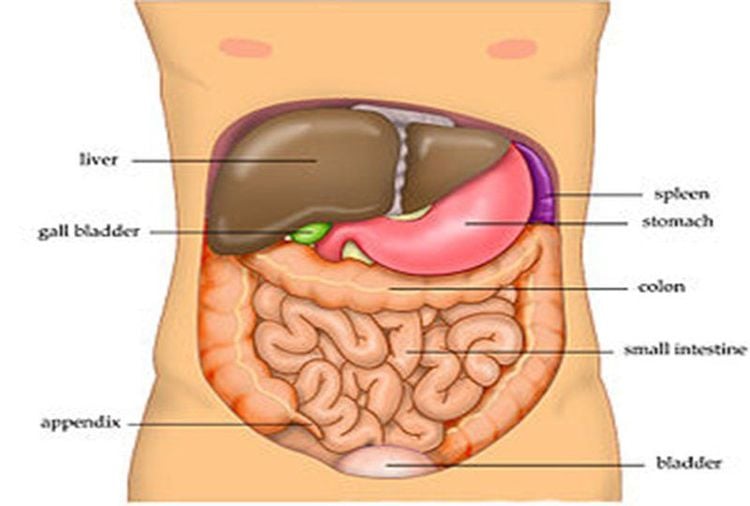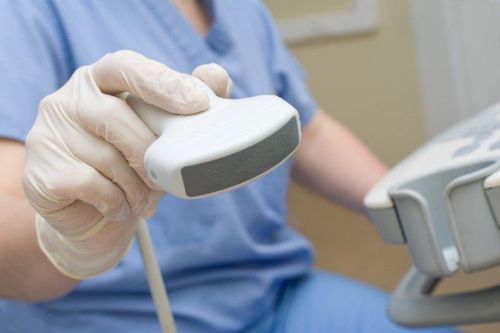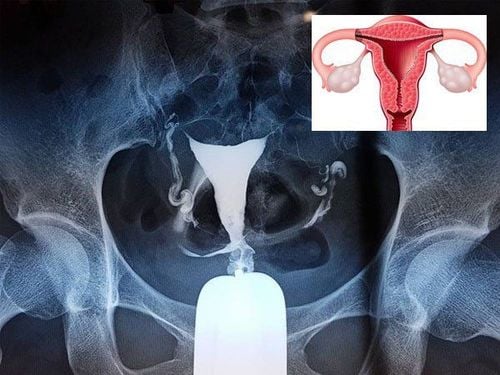This is an automatically translated article.
The article is expertly consulted by Master, Doctor Luu Thi Bich Ngoc - Doctor of Radiology - Department of Diagnostic Imaging and Nuclear Medicine - Vinmec Times City International General Hospital. The doctor has 06 years of experience in the field of diagnostic imaging.1. What is abdominal ultrasound?
General abdominal ultrasound is a subclinical diagnostic technique that is being applied very commonly in medicine today. Abdominal ultrasound helps to capture images of the abdomen in real time, helping doctors examine, examine and evaluate injuries in internal organs such as kidneys, liver, bile, spleen, bladder, etc. pancreas, ovaries, uterus... and detect abnormal conditions (if any).Advantages of general abdominal ultrasound:
Abdominal ultrasound takes place quickly (under 20 minutes). Painless and safe for human health. Accurate results, high diagnostic value. Applicable to all patients of all ages and genders. Helps detect important pathologies.

2. The role of abdominal ultrasound
In addition to the routine health check-up, general abdominal ultrasound also helps doctors diagnose and identify specific diseases such as:Liver disease: Cirrhosis, chronic hepatitis, infected liver Fatty liver , benign liver tumor , malignant liver tumor , liver abscess , ... Bile disease : cholecystitis , cholangitis , gallstone , biliary malformation , gallbladder polyp ... Pathology of Digestive: Intussusception, digestive tumors, stomach pain, appendicitis, small bowel inflammation, intestinal volvulus, tumors, blood clots... Pancreatic diseases: Trauma, pancreatic stones, pancreatitis , enlarged spleen, pancreatic cancer, all kinds of tumors in the pancreas,... Urinary diseases: trauma, urinary tract tumors, renal obstruction, malformations, kidney stones, kidney cancer, bladder stones, Bladder cancer , nephritis ... Diseases of the reproductive / reproductive organs : prostate cancer , ovarian cysts , uterine fibroids , pyelonephritis , ovarian cancer , prostatitis paralysis,... Retroperitoneal pathology: retroperitoneal tumor, peritoneal metastatic cancer, retroperitoneal fibrosis In addition, abdominal ultrasound General g also helps to detect many other diseases such as: abdominal aortic aneurysm, assessment of intra-abdominal fluid, pericardium, pleural space...
3. When should abdominal ultrasound?
General abdominal ultrasound is a method that is considered to be quite safe and effective, so doctors recommend each person to actively visit and periodically check their health (with general abdominal ultrasound) every night. at least once a year.
Prolonged abdominal pain, sometimes intense. Feeling indigestion, digestive disorders, vomiting ... leading to serious weight loss. Mental fatigue, loss of appetite for unknown reasons. Palpable or suspected abdominal mass.
4. Abdominal ultrasound procedure
Abdominal ultrasound will be conducted in turn according to the following steps:The patient lies on the examination bed, pulls the shirt up to chest level and pulls the pants low to the level of the pubic bone to facilitate the ultrasound. (Note: women should not wear skirts when going for abdominal ultrasound). The doctor applies the gel evenly on the abdomen, spreads it evenly and places the ultrasound probe on the abdomen. The transducer emits high-frequency ultrasound waves and captures images continuously displayed on the screen to help observe the abdomen and internal organs from many angles. Abdominal ultrasound takes less than 20 minutes and has no pain or risks.

5. Some notes on general abdominal ultrasound
For patients who have never had an abdominal ultrasound done, there is a certain amount of anxiety. In order for the ultrasound process to take place quickly and accurately, you can note the following:Before the abdominal ultrasound, you should fast for 6-8 hours, so the best time to perform an abdominal ultrasound is in the morning. During an abdominal ultrasound, the patient should wear comfortable clothing for ease of use. Patients also need to drink plenty of fluids and hold their urine just before the ultrasound. Holding urine helps stretch the bladder and makes it easier for ultrasound to evaluate the structure of the bladder, prostate, and uterus. For patients with obesity, overweight, for accurate ultrasound results, the patient should limit eating foods that are greasy, difficult to digest and easy to cause bloating. Transvaginal ultrasound is only applied to women who have had sex, before the patient needs to urinate completely to empty the bladder during ultrasound. Ultrasound techniques in other areas such as echocardiography, blood vessels, face and neck, eyes, mammary glands, joints... can be performed immediately with little preparation. However, with abdominal ultrasound, if not prepared in advance, it will make the examination take a long time, have to repeat many times, causing uncomfortable feelings for both the doctor and the patient, so the patient should pay attention to prepare in advance. to make the ultrasound process go smoothly and efficiently.
With the above very important meaning, abdominal ultrasound is one of the indispensable checks in the GENERAL HEALTH EXAMINATION packages at Vinmec International General Hospital. The ultrasound process is carefully performed by experienced and highly qualified sonographers, radiologists, modern ultrasound systems, high technology, providing detailed and clear images. , detects very small irregular images. Early detection of disease and signs of disease will greatly help the treatment process later.
Please dial HOTLINE for more information or register for an appointment HERE. Download MyVinmec app to make appointments faster and to manage your bookings easily.














